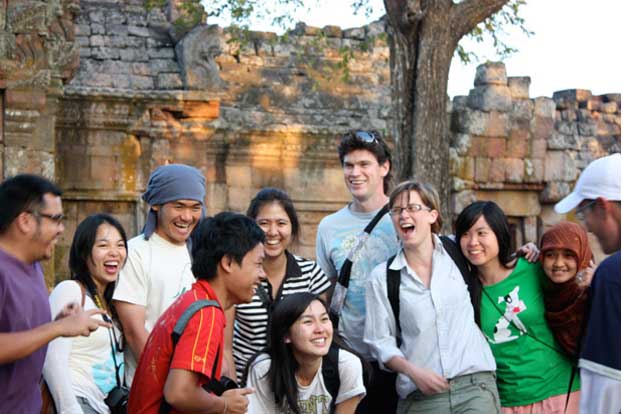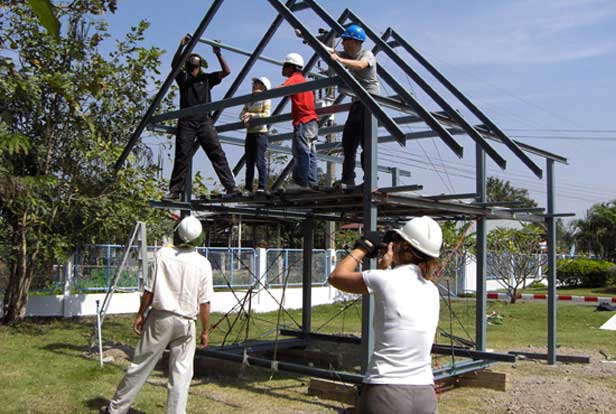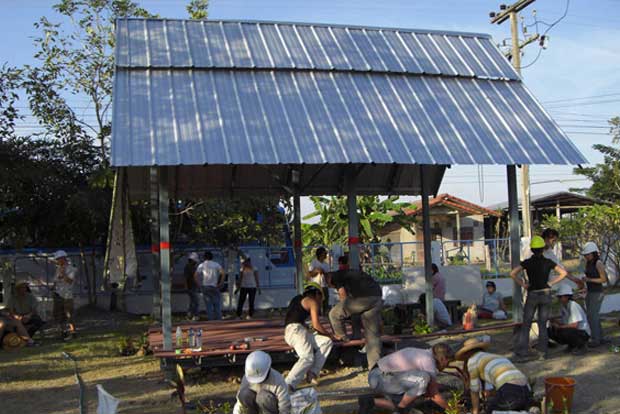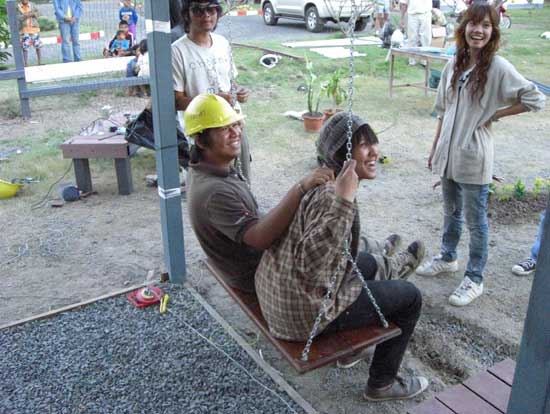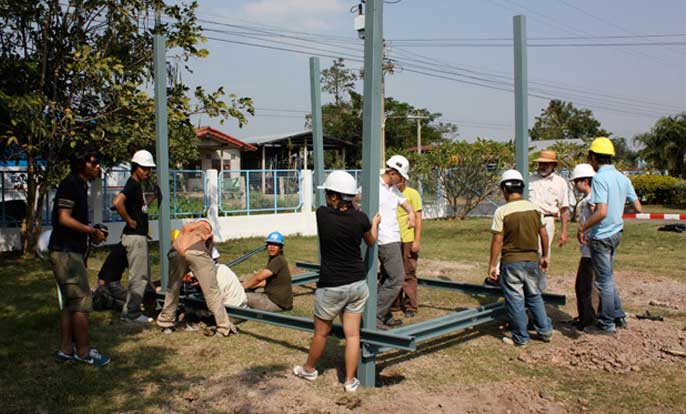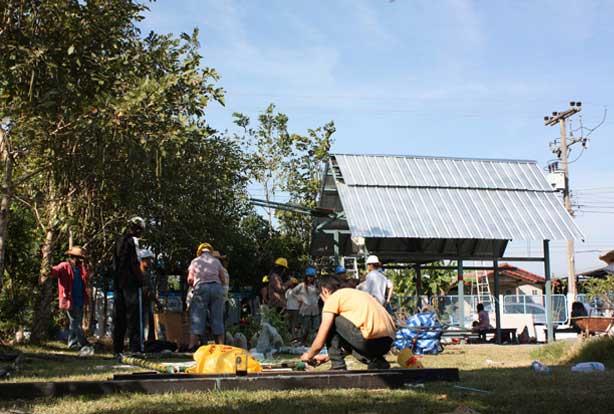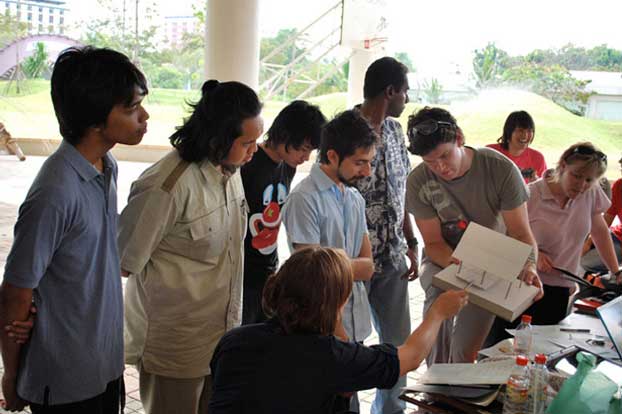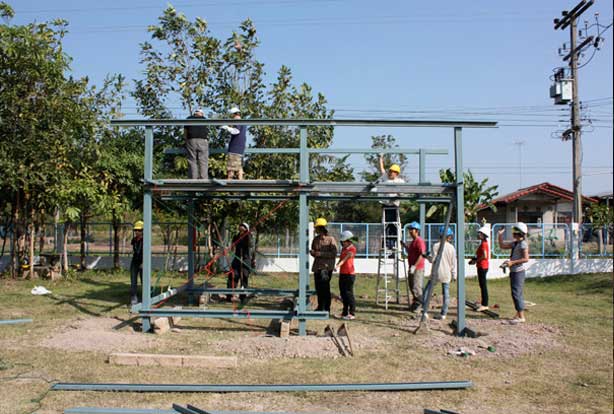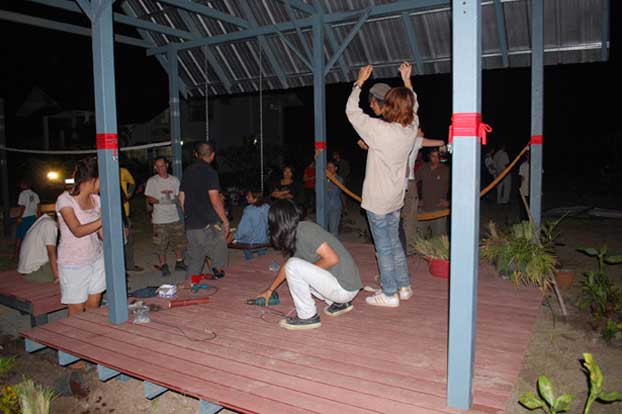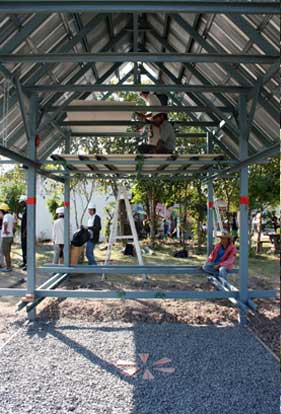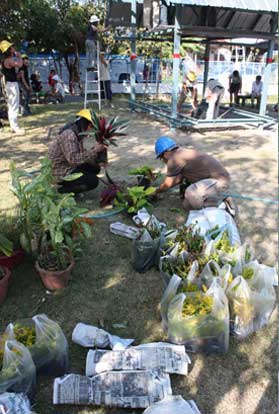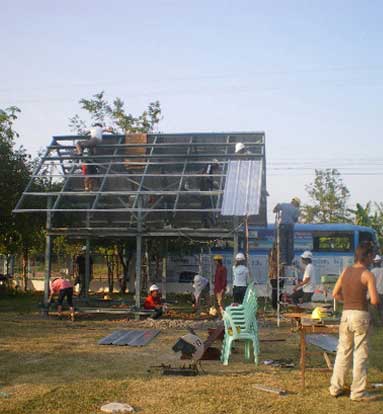Nong Tong Lim Pavillion
- Location: Nong Tong Lim, Thailand
- Completed: December 2008
Nong Tong Lim, a rural village in the north-eastern Isaan region of Thailand was the site for the inaugural international Bower Studio project. David O’Brien’s research activities had identified a changing approach to vernacular building in this region as a result of increased access to global ideas and aspirations, coupled with reduced access to traditional building materials.
Villagers in rural areas of Thailand and throughout the South-East Asian region have traditionally built their housing from locally sourced timbers. As a result, certain typologies and skills have evolved to become part of their cultural fabric. Deforestation in these regions means timber can no longer be harvested sustainably and traditional housing techniques are no longer viable. The shift away from timber construction has highlighted a need to deliver housing using new materials and technologies.
In 2008 staff and students from the University of Melbourne joined with the Thai NGO Population and Community Development Association, Thammasat University and local residents to develop and deliver a Thai style pavilion, or ‘sala’, at the local health clinic. The sala is a multipurpose space and is used as a waiting area by visitors to the clinic, as a base for outdoor exercise programs and a sheltered children’s play area.
As a prototype project, the students of the University of Melbourne and Thammasat University consulted and worked in conjunction with residents of the Nong Tong Lim village to ensure the cultural knowledge and skills of traditional ‘sala’ construction informed the design and fabrication of the new hybrid. Also, engaging local labour ensured the new skills associated with the hybrid ‘sala’ were transferred to the community.
The team worked to design a structure that would be suitable as a prefabricated ‘kit-of-parts’, with the majority of fabrication completed in the Thammasat University workshop in Bangkok. This prefabrication method was vital to allow the prototype to be delivered to site and simply assembled, crucial in remote and rural locations where workshop facilities may be unavailable. This model also allows for semi skilled labourers, under minimal supervision, to self-build once a ‘kit of parts’ is delivered. This community capacity building ensures that the tradition of self-building and the development of skills for ongoing maintenance are retained within the community.
This simple project demonstrates a model and mode for a hybrid building type that utilises traditional typologies, knowledge and skills, yet responds to changes in availability of traditional materials and to new construction technologies. The prototype informs an approach to developing appropriate housing typologies in remote and rural areas that is both environmentally and culturally sustainable, retaining the traditional capacity and skills within communities.
Bower Studio thanks the people of Nong Tong Lim for welcoming the team into their community.
Funding Agencies
- Australia Thai Institute
Project Partners
- Thammasat University
- Population and Community Development Association
Industry Partners
- Surdex Steel
- Modwood
- LiteSteel Technologies
Studio Leaders
- Dr David O’Brien
- Hamish Hill
- Boonanan Natakun
- Vichai Laopanichakul
- Touchaphong Srisuwan
Students
University of Melbourne
- Denis Cairney
- Hing Sindy Chan
- Phillip Jasu Cheung
- Henry Elias
- Sukhjit Kaur Jagjit Singh
- Rebecca Jerram
- Aditya Kuthalam
- Ka Lai Kwok
- Emma Marquard
- Candice Ng
- Ramesh Richards
- Breanna Ryan
- Lena Wang
- Lucy Warnock
- Gilbert Yeong
Thammasat University
- Todsaporn cha-aim
- Wongrat Jiakuntorn
- Somboon Whangmungpon
- Nitisart Booncharoen
- Chalermpol Thanomklang
- Narucha Sriwichian
- Praween Treewattanawong
- Chanachok Pratchyawutthirat
- Nicha Chaipiyaporn
- Chiraporn Kodprom
- Thawalrath chantraruang
- Kalaya Ka-sorn
- Rusanee Sasoei
- Nalinee Chuaphet
- Kanokwan Masuwan

